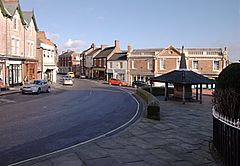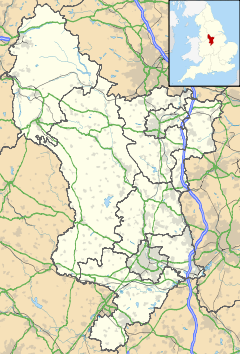- Melbourne, Derbyshire
-
For other uses, see Melbourne (disambiguation).
Coordinates: 52°49′23″N 1°25′44″W / 52.823°N 1.429°W
Melbourne 
The Market Place
 Melbourne shown within Derbyshire
Melbourne shown within DerbyshirePopulation 5,000 + OS grid reference SK385255 District South Derbyshire Shire county Derbyshire Region East Midlands Country England Sovereign state United Kingdom Post town DERBY Postcode district DE73 Dialling code 01332 Police Derbyshire Fire Derbyshire Ambulance East Midlands EU Parliament East Midlands UK Parliament South Derbyshire List of places: UK • England • Derbyshire Melbourne is a Georgian market town in South Derbyshire, England. It is about 8 miles south of Derby and 2 miles from the River Trent.[1] In 1837 a then tiny settlement in Australia was named after William Lamb, 2nd Viscount Melbourne, Queen Victoria's first Prime Minister, and thus indirectly takes its name from Melbourne Hall, seat of the Lamb family, and the village.
Contents
History
The name Melbourne means "mill stream" (or "mill spring"). It was first recorded in Domesday Book (DB 1086 Mileburne = mill stream) as a royal manor.
A parish church was built around 1120.
In 1311 Robert de Holand fortified the existing royal manor house to create Melbourne Castle, though the fortification was never completed. Jean, duc de Bourbon, the most important French prisoner taken at the Battle of Agincourt (1416), was detained at the castle for 19 years.
Mary, Queen of Scots was to be imprisoned at Melbourne Castle, but it had deteriorated into a poor state of repair. By the early 17th century it had fallen into decay and was demolished, although some remains can still be seen.[2]
Melbourne Hall was originally owned by the church; it was constructed in stages, mainly in the 17th and 18th centuries.
During the Second World War a military training railway was operated to the north of the now defunct Melbourne railway station.
Since 2005 Melbourne has run an arts festival every September.[3]
Notable residents
- Robert Bakewell, ironsmith, started his career here in 1706.
- John Joseph Briggs, naturalist lived in Kings Newton and published a History of Melbourne.[4]
- Thomas Cook, travel agent, was born here in 1808.
- William Dexter, painter was born here in 1808.[5]
- Viscount Melbourne, British prime minister, 1834 and 1835-1841.
- Rowland Ordish, civil engineer was born here in 1824.
- John Young, cricketer was born here in 1876.[6]
- Ronald Pope, sculptor and artist
Places of interest
Melbourne parish church has been described as a "cathedral in miniature" and is one of five churches in Melbourne. The Domesday Book records a church and priest here in 1086. The present church was built about 1120, and most of the original masonry is intact, except for the eastern end which has been refurbished. The roofs, naves, aisles and the aisle windows date from the restoration of the 1630s. There was also a restoration done by Gilbert Scott in 1859-62.[7]
Melbourne Hall was originally the rectory house for the Bishop of Carlisle, but was substantially rebuilt by Thomas and George Coke in the early 18th century. The hall's gardens were laid out with the assistance of royal gardeners in 1704. They contain examples of the work of Derby ironsmith, Robert Bakewell. Melbourne Pool was originally used by the nearby mill. The hall is open to the public in August.
The Thomas Cook Memorial Cottages in High Street were built by Thomas Cook who started popular travel in England. Cook was born in Melbourne in 1808 though his birthplace was demolished in 1968. The buildings built in 1890-91 include fourteen cottages, a bakehouse, a laundry and mission hall. They still provide accommodation for some of Melbourne's senior citizens.
Melbourne Market Place is the location of Melbourne's main shops, including the Co-op building and monument which was refurbished in 1998.
Education
Melbourne has two schools: an infant school and a junior school,[8] sharing a site which also contains a youth centre.
Sport
The town plays host to Melbourne Rugby Football Club,[9] Melbourne United Football Club,[10] Melbourne Town Cricket Club.[11] and Melbourne Royal British Legion Tug of War Club, Melbourne Bowls Club.
Culture, industry and transport
The town contains many Georgian buildings and in the 19th century was a centre for framework knitting and footwear manufacture, e.g. Fairystep Shoes. Market gardens have always been a major part of the economy, though now only a handful remain. East Midlands Airport, 5 miles to the east of the town, was opened in the 1960s and has now become a significant regional transport hub. The town's bus service is run by Arriva Midlands. Previously, Trent Barton maintained a small garage in Melbourne, the site going on to become a supermarket. It maintained routes to Swadlincote, Derby, Aston-on-Trent and Weston-on-Trent. Bus services for pupils run to Chellaston School every morning and afternoon. There have been links to East Midlands Airport which were recently axed.[citation needed]
Shops in Melbourne include: Spar, Budgens, Melbourne News, fish and chips, Bird's (bakery), Elle of Melbourne (clothing), Blatch's (electricals), Co-op Travel and Cream Interior Design.
Services in Melbourne include: Natwest, post office, Co-op Pharmacy, Fair Trade, the Athenaeum (an internet cafe),[12] a library, leisure centre and a youth club. There are also several pubs.
In the past Melbourne has had three brass bands which have disappeared over the years. In 1992 a new group formed, and became the Melbourne Town Band.[13] The Town Band continues to play at Melbourne's events today. These include the carnival, held every summer, and the carols in the Market Place.
References
- ^ Melbourne Website
- ^ Melbourne Castle
- ^ Melbourne Festival
- ^ Briggs in Dictionary of National Biography 1866
- ^ Serle, Percival (1949). "Dexter, William". Dictionary of Australian Biography. Sydney: Angus and Robertson
- ^ John Young at Cricket Archive
- ^ Melbourne Parish Church Website
- ^ Melbourne Junior School website
- ^ Melbourne RFC website
- ^ Melbourne United website
- ^ Melbourne Town CC website
- ^ The Athenaeum website
- ^ Melbourne Town Band website
External links
- About Melbourne
- Melbourne news from the Derby Telegraph
- derbyphotos.co.uk: Photo Gallery of Melbourne
Ceremonial county of Derbyshire Unitary authorities Boroughs or districts Major settlements - Alfreton
- Ashbourne
- Bakewell
- Belper
- Bolsover
- Buxton
- Chapel-en-le-Frith
- Chesterfield
- Clay Cross
- Darley Dale
- Derby
- Dronfield
- Eckington
- Glossop
- Hadfield
- Heanor
- Ilkeston
- Killamarsh
- Langley Mill
- Long Eaton
- Matlock
- Melbourne
- New Mills
- Ripley
- Sandiacre
- Shirebrook
- Staveley
- Swadlincote
- Whaley Bridge
- Wirksworth
See also: List of civil parishes in Derbyshire
Rivers Topics Categories:- Market towns in Derbyshire
- Towns in Derbyshire
Wikimedia Foundation. 2010.


